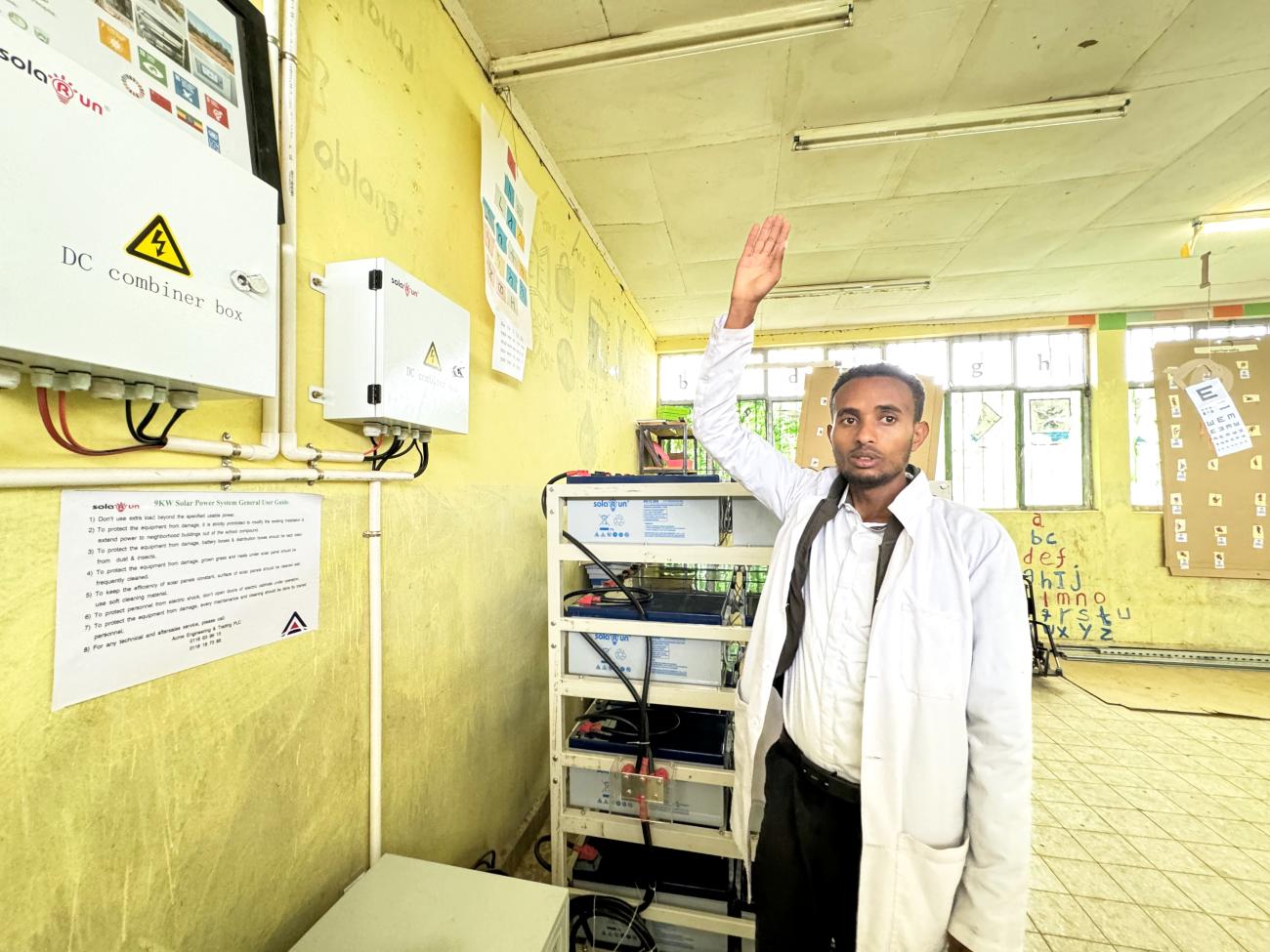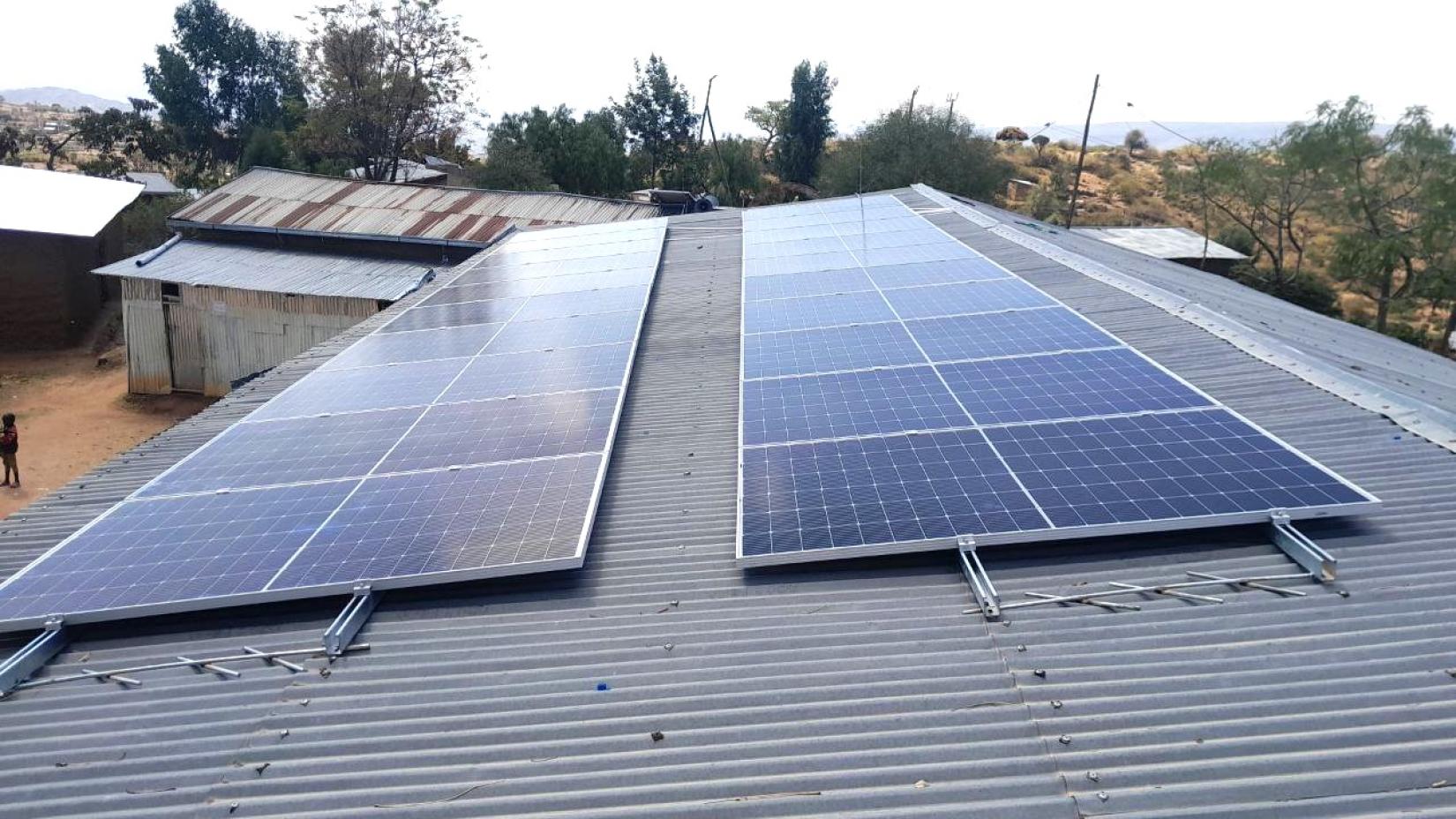Lighting up rural schools and communities with solar energy

Scaling up and expanding renewable energy solutions in rural communities across the country
Felmata Tejuden is a bright grade eight student but school life for her, and many children attending the Kebbele Primary School in rural Sofi woreda, Harar region, is not the same as it is for those living in the urban areas.
The Kebbele Primary School is one of the government-owned schools established to expand access to formal education in rural communities. The school was established fourteen years ago, with local community helping with initial construction; the government has since expanded the infrastructure with an additional building. The school currently enrolls 441 students (23% female) and employs 14 teachers.
The regional government has provided the school with desktops and some audiovisual materials for e-learning. Still, the equipment has largely gone untouched by staff and students.
The predicament was access to reliable electricity in the school and surrounding area.
Yohannes Simenew has been the Kebele Primary School Principal for over a decade.
Yohannes reflects, “The absence of electricity/ power supply in the school and the surrounding community means that we have been forced to travel to the town to prepare and print lesson plans, worksheets, and other supporting materials at our own cost.”
The principal shared his concern that the school's inability to use the technology materials, especially to teach the lower grades, hindered the students' cognitive development.
Neima Yosuf, a member of the school’s parent association for about five years shares similar concerns about the challenges and missed opportunities facing students due to a lack of power in their community.
Neima complains, “Our children never get the chance to learn and benefit from the modern equipment provided by the regional government.” She explains that most children study with a Kuraz, a local name for kerosene lamps. She notes this is not a convenient setup and negatively impacts students’ performance.
Ramadan Ahmed has been a school guard for the past fourteen years and was frustrated with attempting to secure the compound in the dark. He reflected, “I had only one flashlight, which was insufficient and inconvenient to monitor the area and address security concerns”.
Overcoming obstacles
Given the challenges faced by the school communities and the significance of the education sector as stipulated in the sustainable development goals, an integrated renewable energy scheme initiative has emerged to address the issue. The initiative is a south-south trilateral pilot project on biogas, biomass, and solar technologies, to facilitate a transition to sustainable energy use. The project brings together the governments of Ethiopia (through the Ministry of Water and Energy) and China (through the Ministry of Commerce of China, MOFCOM) in partnership with UNDP.
Implemented under a South-South Cooperation framework, the trilateral project aims to showcase successful medium-scale and integrated renewable energy systems in Ethiopia through pilot and demonstration projects. It also serves as a learning platform for Ethiopia, Sri Lanka, and China to collaborate on renewable energy technology and skill transfer and enhance the capacity of participating countries to adopt and integrate sustainable energy technologies and practices in their local contexts.

The project is implemented in Harari, Sidama, and South Ethiopia regions, and is expected to significantly reduce CO2 emissions by 157,310.297tCO2eq over the lifespan of 25-30 years within rural communities. More than 50,000 people (32% female) - including students, teachers, smallholder framers, and households in remote rural areas - are expected to benefit from the demonstrations.
“I was part of this project from its initial design stage to the implementation. Unlike other parts of the region, this area is off the grid, and the primary reason for choosing this [school] was its distance from the main grid. This made it a priority to identify alternative energy solutions to ensure smooth learning and teaching,” Abdi Hassen Adem, Harari Region Energy Development and Promotion Director, explained the process.
Abdi believes that the project’s importance will go beyond the school, and positively impact the surrounding community. He explained that the solar energy solution is expected to extend beyond schools and benefit 60 to 70 households in Sofi woreda through proper planning, design, and consultation with the school administration, local authorities, and other concerned bodies. “We are also planning to invite other donors and private sectors to support us in scaling up these initiatives in the surrounding community and other parts of the region,” Abdi noted.
On 17 July 2024, Kebbele Primary School and the surrounding community hosted a high-level field mission, with the visit of Minister Habtamu Itefa, and State Minister Sultan Woli from the Ministry of Water and Energy, as well as other regional and federal officials. The visiting group also included the UNDP-Ethiopia group headed by Ms Charu Bist, Deputy Resident Representative for Programmes, and representatives from the other UN agencies.
The visit focused on the inspection and inauguration of the newly installed 9kw solar power system that will address the school’s long-standing challenges with sustainable access to electricity and power supply.
During the site visit, Minister Habtamu Itefa highlighted the government’s long-term strategy and plan to expand similar off-grid technologies in remote and rural areas across Ethiopia.
“We have a fragmented population settlement, where most people are far from the main grip power grid, and this issue needs an alternative energy solution. So, we are working not only to expand but also to make it accessible for all in the coming six to seven years. Solar power requires significant investment at the initial stage but can serve for many years with minimum running and maintenance costs, making it the best solution for such a remote community” Minister Habtamu Itefa stated.
He further emphasized the importance of rural students accessing similar technologies to those available in urban areas, stressing that, “It is our responsibility to invest in this generation, ensuring they are competent and fit in the fast-developing world. This cannot be achieved with only ambition; it requires effort, particularly investing in education and children”.
The Minister acknowledged and applauded the collaboration between the governments of China and Ethiopia and UNDP on this project and underscored the need for further collaboration, with similar initiatives to improve access to sustainable energy.
Rebooting the classroom experience
“Yohannes said, “Now our teachers can use the desktops and prepare lesson plans here without a problem. Students in grades four and six have started attending the educational sessions transmitted on national television. We also started using the laboratory for grade seven and eight students, despite the limited lab equipment.”
Towards the greater vision
Considering the important role of renewable energy in achieving future sustainable goals, the Ministry of Water and Energy in collaboration with other development partners, is working to scale up and expand renewable energy solutions in rural communities across the country.
“Solar technology will play a crucial role in improving the economic burden of our society. This project is one of the pilot projects and we are about to install 156 additional similar alternative power supplies in various schools and health facilities in rural communities. This investment will enhance the delivery of services of the various sectors,” adds State Minister Sultan Woli, giving the example of improvement in maternal healthcare services.
State Minister Sultan also announced that three schools in the Harari region will soon benefit from the Access to Distributed Electricity and Lighting in Ethiopia (ADELE) projects, implemented throughout the country with the support of the World Bank.


